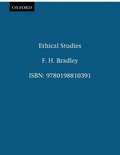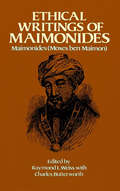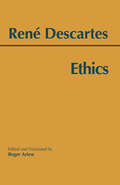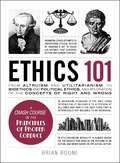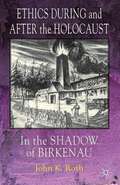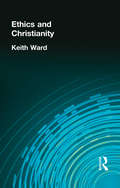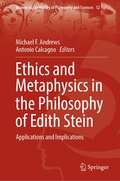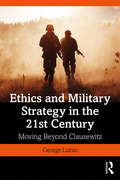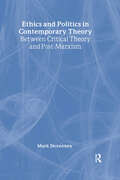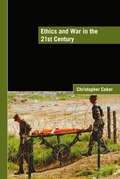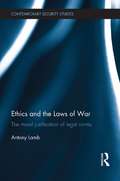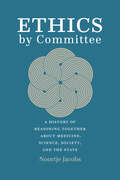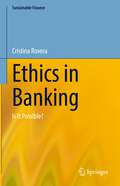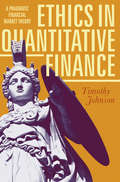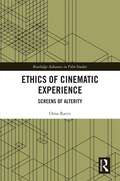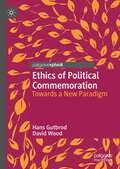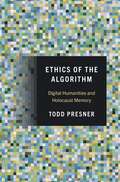- Table View
- List View
Ethical Studies (Second Edition)
by F. H. BradleyBritish Idealist F. H. Bradley (1846-1924) was one of the most distinguished and influential philosophers of his time. He made contributions to metaphysics, moral philosophy and the philosophy of logic. The author of Appearance and Reality (1893), a classic in metaphysics (also reissued in this series), he rejected pluralism and realism. In this polemic, first published in 1876, Bradley argues against the dominant ethical theories of his time. Essays in this book entitled 'Pleasure for Pleasure's Sake' and 'Duty for Duty's Sake' examine and criticise hedonistic utilitarianism and Kantian ethics respectively. Bradley disagreed with individualism, and in 'My Station and its Duties' he discusses the idea that self-realisation can only be found as part of the social organism. This is a classic ethical work that will be valuable both to those studying the ethical theories discussed, and to those interested in the history of philosophy.
Ethical Writings of Maimonides
by MaimonidesPhilosopher, physician, and master of rabbinical literature, Moses ben Maimon (1135-1204) strove to reconcile biblical revelation with medieval Aristotelianism. His writings, especially the celebrated Guide for the Perplexed, exercised considerable influence on both Jewish and Christian scholasticism and brought him lasting renown as one of the greatest medieval thinkers.This volume contains his most significant ethical works, newly translated from the original sources by Professors Raymond L. Weiss and Charles E. Butterworth, well-known Maimonides scholars. Previous translations have often been inadequate -- either because they were not based on the best possible texts or from a lack of precision. That deficiency has been remedied in this text; the translations are based on the latest scholarship and have been made with a view toward maximum accuracy and readability. Moreover, the long "Letter to Joseph" has been translated into English for the first time.This edition includes the following selections:I. Laws Concerning Character Traits (complete)II. Eight Chapters (complete)III. On the Management of HealthIV. Letter to JosephV. Guide of the PerplexedVII. The Days of the MessiahTaken as a whole, this collection presents a comprehensive and revealing overview of Maimonides' thought regarding the relationship of revelation and reason in the sphere of ethics. Here are his teachings concerning "natural law," secular versus religious authority, the goals of moral conduct, diseases of the soul, the application of logic to ethical matters, and the messianic era. Throughout, the great sage is concerned to reconcile the apparent divergence between biblical teachings and Greek philosophy.
Ethics (Hackett Classics)
by René DescartesThough Descartes never wrote a book specifically devoted to moral philosophy, his thought on ethical matters can be found throughout his correspondence and in parts of his work Passions of the Soul. In 1685, an anonymous editor in London gathered these writings in a textbook devoted to Descartes&’s ethical thought. Roger Ariew has translated, from Descartes&’s original French texts, those selections included in the 1685 volume, adding to those writings an Appendix of relevant materials, including Part III of the Discourse on Method on the provisional morals, a portion of the Preface to the French edition of the Principles of Philosophy on the &“tree&” of philosophy, and portions of additional letters that help to illuminate the background for the correspondence included in the 1685 volume. Ariew&’s insightful Introduction explains the contexts in which Descartes addressed ethical questions, the reasoning behind his reluctance to write specifically about moral issues, and the significance of what this collection of writings reveals.
Ethics 101: From Altruism and Utilitarianism to Bioethics and Political Ethics, an Exploration of the Concepts of Right and Wrong (Adams 101)
by Brian BooneExplore the mysteries of morality and the concept of right and wrong with this accessible, engaging guide featuring basic facts along with an overview of modern-day issues ranging from business ethics and bioethics to political and social ethics.Ethics 101 offers an exciting look into the history of moral principles that dictate human behavior. Unlike traditional textbooks that overwhelm, this easy-to-read guide presents the key concepts of ethics in fun, straightforward lessons and exercises featuring only the most important facts, theories, and ideas. Ethics 101 includes unique, accessible elements such as: -Explanations of the major moral philosophies including utilitarianism, deontology, virtue ethics, and eastern philosophers including Avicenna, Buddha, and Confucius. -Classic thought exercises including the trolley problem, the sorites paradox, and agency theory -Unique profiles of the greatest characters in moral philosophy -An explanation of modern applied ethics in bioethics, business ethics, political ethics, professional ethics, organizational ethics, and social ethics From Plato to Jean-Paul Sartre and utilitarianism to antirealism, Ethics 101 is jam-packed with enlightening information that you can’t get anywhere else!
Ethics After Aristotle
by Brad InwoodFrom the earliest times, philosophers and others have thought deeply about ethical questions. But it was Aristotle who founded ethics as a discipline with clear principles and well-defined boundaries. Ethics After Aristotle focuses on the reception of Aristotelian ethical thought in the Hellenistic and Roman worlds, underscoring the thinker's enduring influence on the philosophers who followed in his footsteps from 300 BCE to 200 CE. Beginning with Aristotle's student and collaborator Theophrastus, Brad Inwood traces the development of Aristotelian ethics up to the third-century Athenian philosopher Alexander of Aphrodisias. He shows that there was no monolithic tradition in the school, but a rich variety of moral theory. The philosophers of the Peripatetic school produced surprisingly varied theories in dialogue with other philosophical traditions, generating rich insight into human virtue and happiness. What unifies the different strands of thought--what makes them distinctively Aristotelian--is a form of ethical naturalism: that our knowledge of the good and virtuous life depends first on understanding our place in the natural world, and second on the exercise of our natural dispositions in distinctively human activities. What is now referred to as "virtue ethics," Inwood argues, is a less important part of Aristotle's legacy than the naturalistic approach Aristotle articulated and his philosophical descendants developed further. Offering a wide range of ways of thinking about ethics from an ancient perspective, Ethics After Aristotle is a penetrating study of how philosophy evolves in the wake of an unusually powerful and original thinker.
Ethics As Foreign Policy: Britain, The EU and the Other (Interventions)
by Dan BulleyEthical foreign policy has often been considered utopian, unrealistic and potentially very dangerous. Dan Bulley argues for a reconceptualisation of ethics as foreign policy, as both look to how we can, and ought to, relate to others. Inspired by the deconstructive thought of Jacques Derrida, Bulley studies the ethical claims of British (1997-2007) and EU (1999-2004) foreign policy. These claims are read against themselves to illustrate their deep ambiguity. A textual analysis of speeches, statements and interviews given by foreign policy makers shows that a responsibility to save ‘Africa’, to protect Iraqis, and to hospitably welcome the Balkans into the EU are also irresponsible, inhospitable and unethical. The author contends that foreign policies making a claim to morality are ethical and unethical, in their own terms, suggesting that while a truly ethical foreign policy remains ultimately unachievable, it does not justify abandoning a responsible relation to others. Rather, a negotiation of ethics as foreign policy suggests potential individual, context-bound decisions which remain open to contestation and permanent critique. Bulley argues that the goal of ethical foreign policy must be maintained as a productive hope of what is neither completely impossible, nor entirely possible.
Ethics During and After the Holocaust: In the Shadow of Birkenau
by John K. RothAbsent the overriding or moral sensibilities, if not the collapse or collaboration of ethical traditions, the Holocaust could not have happened. Its devastation may have deepened conviction that there is a crucial difference between right and wrong; its destruction may have renewed awareness about the importance of ethical standards and conduct. But Birkenau, the main killing center at Auschwitz, also continues to cast a disturbing shadow over basic beliefs concerning right and wrong, human rights, and the hope that human beings will learn from the past. This book explores those realities and the issues they contain. It does so not to discourage but to encourage, not to deepen darkness and despair but to face those realities honestly and in a way that can make post-Holocaust ethics more credible and realistic. The book's thesis is that nothing human, natural or divine guarantees respect for the ethical values and commitments that are most needed in contemporary human existence, but nothing is more important than our commitment to defend them, for they remain as fundamental as they are fragile, as precious as they are endangered.
Ethics and Christianity
by Keith WardFirst published in 2002. Routledge is an imprint of Taylor & Francis, an informa company.
Ethics and Enjoyment in Late Medieval Poetry
by Jessica RosenfeldJessica Rosenfeld provides a history of the ethics of medieval vernacular love poetry by tracing its engagement with the late medieval reception of Aristotle. Beginning with a history of the idea of enjoyment from Plato to Peter Abelard and the troubadours, the book then presents a literary and philosophical history of the medieval ethics of love, centered on the legacy of the Roman de la Rose. The chapters reveal that 'courtly love' was scarcely confined to what is often characterized as an ethic of sacrifice and deferral, but also engaged with Aristotelian ideas about pleasure and earthly happiness. Readings of Machaut, Froissart, Chaucer, Dante, Deguileville and Langland show that poets were often markedly aware of the overlapping ethical languages of philosophy and erotic poetry. The study's conclusion places medieval poetry and philosophy in the context of psychoanalytic ethics, and argues for a re-evaluation of Lacan's ideas about courtly love.
Ethics and Metaphysics in the Philosophy of Edith Stein: Applications and Implications (Women in the History of Philosophy and Sciences #12)
by Antonio Calcagno Michael F. AndrewsThis book is dedicated to Edith Stein (1891–1942), who is known widely for her contributions to metaphysics. Though she never produced a dedicated work on questions of ethics, her corpus is replete with pertinent reflections. This book is the first major scholarly volume dedicated to exploring Stein’s ethical thought, not only for its wide-ranging content, from her earlier to later works, but also for its applications to such fields as psychology, theology, education, politics, law, and culture. Leading international scholars come together to provide a systematic account of Stein’s ethics, highlighting its relation to Stein’s highly developed and complex metaphysics. Questions about the good, evil, the rights and ethical comportment of the person, the state, and feminism are addressed. The book appeals to scholars interested in the history of philosophical and ethical thought
Ethics and Military Strategy in the 21st Century: Moving Beyond Clausewitz (War, Conflict and Ethics)
by George R. Lucas, Jr.This book examines the importance of "military ethics" in the formulation and conduct of contemporary military strategy. Clausewitz’s original analysis of war relegated ethics to the side-lines in favor of political realism, interpreting the proper use of military power solely to further the political goals of the state, whatever those may be. This book demonstrates how such single-minded focus no longer suffices to secure the interest of states, for whom the nature of warfare has evolved to favor strategies that hold combatants themselves to the highest moral and professional standards in their conduct of hostilities. Waging war has thus been transformed in a manner that moves beyond Clausewitz’s original conception, rendering political success wholly dependent upon the cultivation and exercise of discerning moral judgment by strategists and combatants in the field. This book utilizes a number of perspectives and case studies to demonstrate how ethics now plays a central role in strategy in modern armed conflict. This book will be of much interest to students of just war, ethics, military strategy, and international relations.
Ethics and Philosophical Critique in William James
by Sarin MarchettiMarchetti offers a revisionist account of James's contribution to moral thought in the light of his pragmatic conception of philosophical activity. He sketches a composite picture of a Jamesian approach to ethics revolving around the key notion and practice of a therapeutic critique of one's ordinary moral convictions and style of moral reasoning.
Ethics and Politics in Contemporary Theory Between Critical Theory and Post-Marxism (Routledge Innovations in Political Theory #Vol. 4)
by Mark DevenneyIn addressing the political and theoretical debates between critical and post-Marxist theorists, this book discusses the politics of communication and rationality, subjectivity, sovereignty, ethics and deliberative democracy, considering questions such as:* Does the theory of communicative action justify deliberative democracy?* Is a theory of hegemony compatible with an account which relies upon an ideal of communicative success?* Is autonomy a good which should be fostered?* Can the ideal of democracy extend beyond the nation state?* Does post-Marxism have anything interesting to say about ethics?Analysing the work of Ernesto Laclau and Jürgen Habermas - as representatives of different choices made in regard to theory, politics and morality - Ethics and Politics in Contemporary Theory develops a critical response to the contrasting conclusions of these approaches.
Ethics and War in the 21st Century (Lse International Studies Ser.)
by Christopher CokerThis book explores the ethical implications of war in the contemporary world. The author, a leading theorist of warfare, explains why it is of crucial importance that Western countries should continue to apply traditional ethical rules and practices in war, even when engaging with international terrorist groups.The book uses the work of the late Am
Ethics and the Global Financial Crisis
by Boudewijn De BruinIn this topical book, Boudewijn de Bruin examines the ethical 'blind spots' that lay at the heart of the global financial crisis. He argues that the most important moral problem in finance is not the 'greed is good' culture, but rather the epistemic shortcomings of bankers, clients, rating agencies and regulators. Drawing on insights from economics, psychology and philosophy, de Bruin develops a novel theory of epistemic virtue and applies it to racist and sexist lending practices, subprime mortgages, CEO hubris, the Madoff scandal, professionalism in accountancy and regulatory outsourcing of epistemic responsibility. With its multidisciplinary reach, Ethics and the Global Financial Crisis will appeal to scholars working in philosophy, business ethics, economics, psychology and the sociology of finance. The many concrete examples and case studies mean that this book will also prove useful to policy-makers and regulators.
Ethics and the Laws of War: The Moral Justification of Legal Norms (Contemporary Security Studies)
by Antony LambThis book is an examination of the permissions, prohibitions and obligations found in just war theory, and the moral grounds for laws concerning war. Pronouncing an action or course of actions to be prohibited, permitted or obligatory by just war theory does not thereby establish the moral grounds of that prohibition, permission or obligation; nor does such a pronouncement have sufficient persuasive force to govern actions in the public arena. So what are the moral grounds of laws concerning war, and what ought these laws to be? Adopting the distinction between jus ad bellum and jus in bello, the author argues that rules governing conduct in war can be morally grounded in a form of rule-consequentialism of negative duties. Looking towards the public rules, the book argues for a new interpretation of existing laws, and in some cases the implementation of completely new laws. These include recognising rights of encompassing groups to necessary self-defence; recognising a duty to rescue; and considering all persons neither in uniform nor bearing arms as civilians and therefore fully immune from attack, thus ruling out ‘targeted’ or ‘named’ killings. This book will be of much interest to students of just war theory, ethics of war, international law, peace and conflict studies, and Security Studies/IR in general.
Ethics and the Orator: The Ciceronian Tradition of Political Morality
by Gary A. RemerFor thousands of years, critics have attacked rhetoric and the actual practice of politics as unprincipled, insincere, and manipulative. In Ethics and the Orator, Gary A. Remer disagrees, offering the Ciceronian rhetorical tradition as a rejoinder. He argues that the Ciceronian tradition is based on practical or “rhetorical” politics, rather than on idealistic visions of a politics-that-never-was—a response that is ethically sound, if not altogether morally pure. Remer’s study is distinct from other works on political morality in that it turns to Cicero, not Aristotle, as the progenitor of an ethical rhetorical perspective. Contrary to many, if not most, studies of Cicero since the mid-nineteenth century, which have either attacked him as morally indifferent or have only taken his persuasive ends seriously (setting his moral concerns to the side), Ethics and the Orator demonstrates how Cicero presents his ideal orator as exemplary not only in his ability to persuade, but in his capacity as an ethical person. Remer makes a compelling case that Ciceronian values—balancing the moral and the useful, prudential reasoning, and decorum—are not particular only to the philosopher himself, but are distinctive of a broader Ciceronian rhetorical tradition that runs through the history of Western political thought post-Cicero, including the writings of Quintilian, John of Salisbury, Justus Lipsius, Edmund Burke, the authors of The Federalist, and John Stuart Mill.
Ethics by Committee: A History of Reasoning Together about Medicine, Science, Society, and the State
by Noortje JacobsHow liberal democracies in the late twentieth century have sought to resolve public concerns over charged issues in medicine and science. Ethics boards have become obligatory passage points in today’s medical science, and we forget how novel they really are. The use of humans in experiments is an age-old practice that records show goes back to at least the third century BC, and it has been popular as a practice since the early modern period. Yet in most countries around the world, hardly any formal checks and balances existed to govern the communal oversight of experiments involving human subjects until at least the 1960s. Ethics by Committee traces the rise of ethics boards for human experimentation in the second half of the twentieth century. Using the Netherlands as a case study, historian Noortje Jacobs shows how the authority of physicians to make decisions about clinical research in this period gave way in most developed nations to formal mechanisms of communal decision-making that served to regiment the behavior of individual researchers. This historically unprecedented change in scientific governance came out of the growing international wariness of medical research in the decades after World War II and was meant to solidify a new way of reasoning together in liberal democracies about medicine and science. But what reasoning together meant, and who was invited to participate, changed drastically over time. In detailing this history, Jacobs shows that research ethics committees were originally intended not only to make human experimentation more ethical but also to raise its epistemic quality and intensify the use of new clinical research methods. By examining complex negotiations over the appropriate governance of human subjects research, Ethics by Committee is an important contribution to our understanding of the randomized controlled trial and the history of research ethics and bioethics more generally.
Ethics in Banking: Is It Possible? (Sustainable Finance)
by Cristina RoveraBanks are frequently considered usurers. Is it possible to talk about ethics when you analyse banking activity? This book focuses on this question and starts with the history and the philosophy. Philosophers like Aristotle, Immanuel Kant and John Stuart Mill proposed different theories about the need for ethics in finance. If we accept Mill's thought, the production of wealth in society is driven by the personal pursuit of profit. But - unfortunately - this does not, on its own, ensure collective well-being. It must be guided by a superior mechanism which transforms it into wealth for all. This introduces the role of financial institutions, which often have to comply with legal obligations. The book focuses on the role that these institutions have in supporting the ‘ethical’ use of money. The author analyses a number of cases in banks and the financial industry and discusses topics like anti-money laundering, anti-usury, islamic finance, microcredit and bank rescue systems, including not only best practices but also examples of unethical financial management.
Ethics in Quantitative Finance
by Timothy JohnsonThis book presents an ethical theory for financial transactions that underpins the stability of modern economies. It combines elements from history, ethics, economics and mathematics to show how these combined can be used to develop a pragmatic theory of financial markets. Written in three sections; section one examines the co-evolution of finance and mathematics in an ethical context by focusing on three periods: pre-Socratic Greece, Western Europe in the thirteenth century and North-western Europe in the seventeenth century to demonstrate how the historical development of markets and finance were critical in the development of European ideas of science and democracy. Section two interprets the evidence presented in section one to provide examples of the norms reciprocity, sincerity and charity and introduce the pragmatic theory. Section three uses the pragmatic theory to interpret recent financial crises, address emergent phenomena and relate the theory to alternative contemporary theories of markets. Presenting a unique synthesis of mathematical and behavioural approaches to finance this book provides explicit ethical guidance that will be of interest to academics and practitioners alike.
Ethics of Cinematic Experience: Screens of Alterity (Routledge Advances in Film Studies)
by Orna RavivEthics of Cinematic Experience: Screens of Alterity deals with the relationship between cinema and ethics from a philosophical perspective, finding an intrinsic connection between film spectatorship and the possibility of being open to different modes of alterity. The book’s main thesis is that openness to otherness is already found in the basic structures of cinematic experience. Through a close examination of the ethical relevance of the philosophy of Maurice Merleau-Ponty, Stanley Cavell, Emmanuel Levinas and Gilles Deleuze to cinema studies, Ethics of Cinematic Experience: Screens of Alterity pursues the question of how film can open the viewer to what is not her, and so bring her to encounter otherness in a way that is unique to cinematic experience. The book sees ethics as not just the subject, content or story of a film but part of its aesthetic structure. Accompanied by readings of films mainly from mainstream cinema, each chapter focuses on a different aspect of the encounter with alterity through cinema. The book gives particular attention to how theoretical discussion of the cinematic close-up can lead to ethical insights into the status of both the human and the non-human in film, and thus lead to an understanding of the relationships the viewer makes with them. The book is a helpful resource for students and scholars interested in the relationship between philosophy, film and ethics, and is appropriate for students of philosophy and media and cultural studies.
Ethics of Citizenship: Immigration and Group Rights in Germany
by William A. Barbieri Jr.Who is to be included in a political community and on what terms? William A. Barbieri Jr. seeks answers to these questions in this exploration of the controversial concept of citizenship rights--a concept directly related to the nature of democracy, equality, and cultural identity. Through an examination of the case of Germany's settled "guestworkers" and their families, Ethics of Citizenship investigates the pressing problem of political membership in a world marked by increased migration, rising nationalist sentiment, and the ongoing reorganization of states through both peaceful and violent means. Although some of Germany's foreign workers have gradually attained a degree of social and economic legitimacy, Barbieri explains how they remain effectively excluded from true German citizenship. Describing how this exclusion has occurred and assessing current attitudes toward political membership in Germany, he argues for a just and democratic policy toward the tax-paying, migrant worker minority, one that would combine the extension of the individual rights of citizenship with the establishment of certain group rights. Through a dissection of ongoing public "membership debates" over issues such as suffrage, dual citizenship, and immigration and refugee policy, Barbieri identifies a range of competing responses to the question of who "belongs" in Germany. After critiquing these views, he proposes an alternative ethic of membership rooted in an account of domination and human rights that seeks to balance individual and group rights within the context of a commitment to democracy and equal citizenship. Indispensable for scholars of German studies, Ethics of Citizenship also raises questions that will attract moral philosophers, constitutional scholars, and those interested in the continuing, global problems associated with migration.
Ethics of Political Commemoration: Towards a New Paradigm (Twenty-first Century Perspectives on War, Peace, and Human Conflict)
by David Wood Hans GutbrodThis book proposes a new Ethics of Political Commemoration adapted from the Just War tradition, reflecting that remembrance is often conducted with political – and even coercive – intent. With its Ius ad Memoriam (what to commemorate) and Ius in Memoria (how to commemorate) criteria, the framework looks to guide debates that are currently inchoate so that remembrance of the past can transform relationships in the present and build a shared future. Offering a moral argument with memorable illustrations, Gutbrod and Wood draw on experiences from Armenia, Georgia, Ireland, Lebanon, and Libya, while connecting to mainstream debates in Western Europe and the United States. Bringing together an ethical tradition with the practice of conflict transformation, the framework fuses two perspectives that enrich each other. The book, in providing a first systematic presentation of the ethics, seeks to engage citizens and scholars, and help those who work to transform conflicts.
Ethics of the Algorithm: Digital Humanities and Holocaust Memory
by Todd PresnerHow computational methods can expand how we see, read, and listen to Holocaust testimonyThe Holocaust is one of the most documented—and now digitized—events in human history. Institutions and archives hold hundreds of thousands of hours of audio and video testimony, composed of more than a billion words in dozens of languages, with millions of pieces of descriptive metadata. It would take several lifetimes to engage with these testimonies one at a time. Computational methods could be used to analyze an entire archive—but what are the ethical implications of &“listening&” to Holocaust testimonies by means of an algorithm? In this book, Todd Presner explores how the digital humanities can provide both new insights and humanizing perspectives for Holocaust memory and history.Presner suggests that it is possible to develop an &“ethics of the algorithm&” that mediates between the ethical demands of listening to individual testimonies and the interpretative possibilities of computational methods. He delves into thousands of testimonies and witness accounts, focusing on the analysis of trauma, language, voice, genre, and the archive itself. Tracing the affordances of digital tools that range from early, proto-computational approaches to more recent uses of automatic speech recognition and natural language processing, Presner introduces readers to what may be the ultimate expression of these methods: AI-driven testimonies that use machine learning to process responses to questions, offering a user experience that seems to replicate an actual conversation with a Holocaust survivor.With Ethics of the Algorithm, Presner presents a digital humanities argument for how big data models and computational methods can be used to preserve and perpetuate cultural memory.
Ethics with Aristotle
by Sarah BroadieSarah Broadie gives an argued account of the main topics of Aristotle's ethics: eudaimonia, virtue, voluntary agency, practical reason, akrasia, pleasure, and the ethical status of theoria. She explores the sense of "eudaimonia," probes Aristotle's division of the soul and its virtues, and traces the ambiguities in "voluntary."
